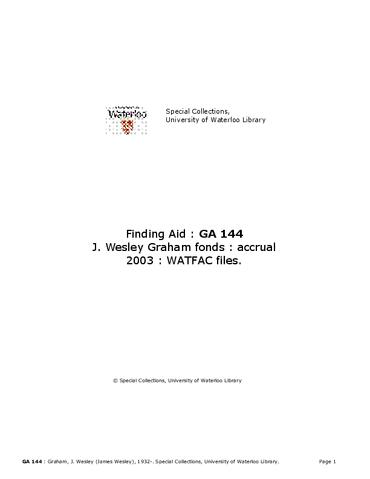Title and statement of responsibility area
Title proper
J. Wesley Graham fonds : 2003 accrual : WATFAC files.
General material designation
Parallel title
Other title information
Title statements of responsibility
Title notes
- Source of title proper: Title from content of the accrual.
Level of description
Accession
Reference code
Edition area
Edition statement
Edition statement of responsibility
Class of material specific details area
Statement of scale (cartographic)
Statement of projection (cartographic)
Statement of coordinates (cartographic)
Statement of scale (architectural)
Issuing jurisdiction and denomination (philatelic)
Dates of creation area
Date(s)
Physical description area
Physical description
1.5 m of textual records
80 computer disks
7 photographs : b&w ; 21 x 26 cm
Publisher's series area
Title proper of publisher's series
Parallel titles of publisher's series
Other title information of publisher's series
Statement of responsibility relating to publisher's series
Numbering within publisher's series
Note on publisher's series
Archival description area
Name of creator
Biographical history
James Wesley Graham was a Canadian computing pioneer who was known as the "father of computing" at the University of Waterloo and who was "chiefly responsible for the university's international reputation in software development." (Donn Downey, The Globe and Mail).
Born in Copper Cliff, Ontario on Jan. 17, 1932, he studied mathematics and physics at the University of Toronto from 1950-1955. He worked for IBM Canada until 1959 when he joined the University of Waterloo. At first he taught statistics in the the Dept. of Mathematics where a "Computing Centre" was established in 1960. When it became a separate department in 1962, he became the director. He pioneered the creation of software to support education, especially in the teaching of computer programming and in making computing accessible. In the 1960's he worked with the Ministry of Education to develop computer programming instruction courses for high school students. He received the Order of Canada in 1999 for his contributions to computer science. James Wesley Graham died in 1999.
Custodial history
Scope and content
Accrual consists of material relating to the history, organization and operation of Waterloo Foundation for the Advancement of Computing, Inc. from its foundation in 1974 to 1998. A large portion of the files deal with individual fellowships funded by WATFAC. Includes correspondence, reports, legal documents, financial information, electronic records (computer disks) and photographs.
Notes area
Physical condition
Immediate source of acquisition
Donated in 2003 by the Estate of J. Wesley Graham.
Arrangement
Arranged in alphabetical order.
Language of material
Script of material
Location of originals
Availability of other formats
Diskettes sent for data extraction 2021:
File 2 (2 diskettes extracted)
File 33 (19 diskettes extracted, 1 diskette failed)
File 37 (4 diskettes extracted, 1 diskette failed)
File 38 (3 diskettes extracted)
File 39 (1 diskette extracted)
File 40 (1 diskette extracted)
File 41 (2 diskettes extracted)
File 42 (1 diskette extracted, 1 diskette failed)
File 43 (2 diskettes extracted)
File 44 (2 diskettes extracted)
File 45 (1 diskette extracted, 1 diskette failed)
File 46 (2 diskettes extracted)
File 47 (1 diskette extracted)
File 48 (1 diskette failed)
File 49 (1 diskette extracted)
File 52 (10 diskettes extracted, 1 diskette failed)
File 53 (1 diskette extracted)
File 54 (1 diskette extracted)
File 55 (5 diskettes extracted)
File 56 (1 diskette extracted)
File 57 (1 diskette failed)
File 59 (1 diskette extracted)
File 60 (3 diskettes extracted)
File 62 (4 diskettes extracted)
File 151 (1 diskette extracted)
File 152 (1 diskette extracted)
File 153b (2 diskettes extracted)
File 159 (1 diskette extracted)
Restrictions on access
Some files may be restricted.
Terms governing use, reproduction, and publication
Finding aids
Associated materials
Accruals
Alternative identifier(s)
Standard number area
Standard number
Access points
Place access points
Name access points
- University of Waterloo (Subject)

